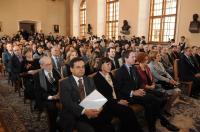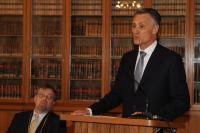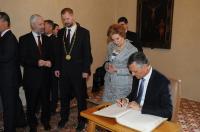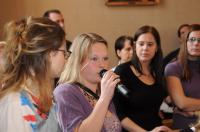Portuguese President: “Your decision to study Portuguese was right and will prove fruitful”




21 April 2010
The opportunity to meet and debate with students after the official programme is something that all statesmen and distinguished guests appreciate. The President of the Portuguese Republic J. E. prof. Dr. Aníbal Cavaco Silva showed that sentiment when he introduced his speech at the university by saying: “I will start speaking in English, but then I will continue in Portuguese, so that I can test the skills of students of Charles University in Portuguese.”
The President lauded the long-lasting tradition of economic and cultural ties between the Czech Republic and Portugal, highlighting the cooperation between Czech and Portuguese universities. The significance of the President's visit to Charles University was, among other things, proved by the fact that the Rector of Universidade de Lisboa, his Magnificence António Sampaio da Nóvoa was in Mr. Silva's entourage.
The president paid respect to the dedication with which Portuguese language and culture are being studied in the Czech Republic: “I am very grateful for this – it is our shared contribution to the long history of the Czech-Portuguese relationship and a hope for the future. The founding of the Department of Czech Studies in Lisbon is a manifestation of the increasingly profound collaboration.”
The first question from the audience of Charles University students concerned the prospects of an international ortography cooperation. “As of now, five countries have signed the agreement on ortography cooperation: Portugal, Brazil, Cape Verde, Guinea-Bissau and Timor; we are waiting for Angola and Mozambique to ratify. All of these countries realize that the ratification of the ortography agreement is essential. In Brazil, the agreement is already in action, in Portugal, we are going through a transitory phase, but some media already follow the new rules. There are currently eight countries in the world that use Portuguese as their official language with 250 million speakers. An initiative was launched at the recent meeting of the heads of governments of Portuguese-speaking countries in New York to make Portuguese one of the official languages of the United Nations. At another meeting in Brazil, a strategic plan was ratified to promote Portuguese in the international arena. Because of this, I believe that your decision to study Portuguese was right and will prove fruitful.”
Answering a question of another student of Portuguese, who asked what the level of the cultural relationships between the Czech Republic and Portugal is and will be in the future, Mr. Silva stressed that these relationships are among the most important ones: “It is a pleasure to see translations from Portuguese receiving prestigious Czech literary awards – and I have already mentioned the significance of the Department of Czech Studies at the University of Lisbon. Another, more particular example of active collaborations would be the Czech writer who has lived in Portugal for 50 years and who is here with us today. Also, Charles University is a part of the Coimbra Group, which is very active in regard to this agenda. And last but not the least, I have met many Czech people during my visit whose Portuguese is excellent. I believe that this is the way to make the mutual understanding between our nations deeper both today and in the future.”
A fourth year student of the Charles University Faculty of Medicine in Pilsen originally from Portugal, speaking on behalf of the organization of Portuguese students studying abroad that has over 1,000 members, then made a plea to the President: “On behalf of all the Portuguese students studying abroad, I would like to ask you to create conditions for us to return home. Portugal takes steps to employ foreign experts in the field of medicine and we can see no reason for us to study abroad. We miss our families and friends and want to have a career in Portugal. I would also like to point out that the Bologna Process should be taken more seriously in regard to recognition of education and academic qualification.” President Silva answered by saying that he will take this into account and that he will discuss all these topic with students at the afternoon meeting.
The friendly discussion with the students of Charles University concluded with an account of all the unique tourist destinations in Portugal – the places from where Prince Henry the Navigator planned all the expeditions that opened new horizons and shortened distances around the globe.
“Thanks to Charles University for its contribution to promotion of Portuguese language and literature in the Czech Republic. Thanks to the professors of the Institute of Romance Studies of the Faculty of Arts for their excellent work”, the president wrote into the Charles University's offical visitors book.
In 2003, a center for Portuguese language, the Institute Camoes Praga (http://www.institutocamoes-praga.cz/index_port.php) was founded at the Charles Univesity Faculty of Arts. „The Institute offers a range of language courses from beginner up to advanced levels, and holds lecture series on Portuguese and Brazilian art. This semester, we are focusing on Portuguese literature and film”, says Šárka Grauová from the Institute of Romance Studies. „The courses also help students prepare for the admission exams for the Faculty of Arts undergraduate programme in Portuguese.”
As of now, around 400 Portuguese students are enrolled at Charles University, over 300 of whom are self-funded. Under the Erasmus exchange programme, 49 Portuguese students have enrolled at the university this semester.
Teacher and researcher exchanges in the fields of pharmacology, microbiology, education, law, psychology, Romance studies and environment between Charles University and Universidade de Coimbra have been going on for more than 30 years.
Translation: Jaroslav Švelch
